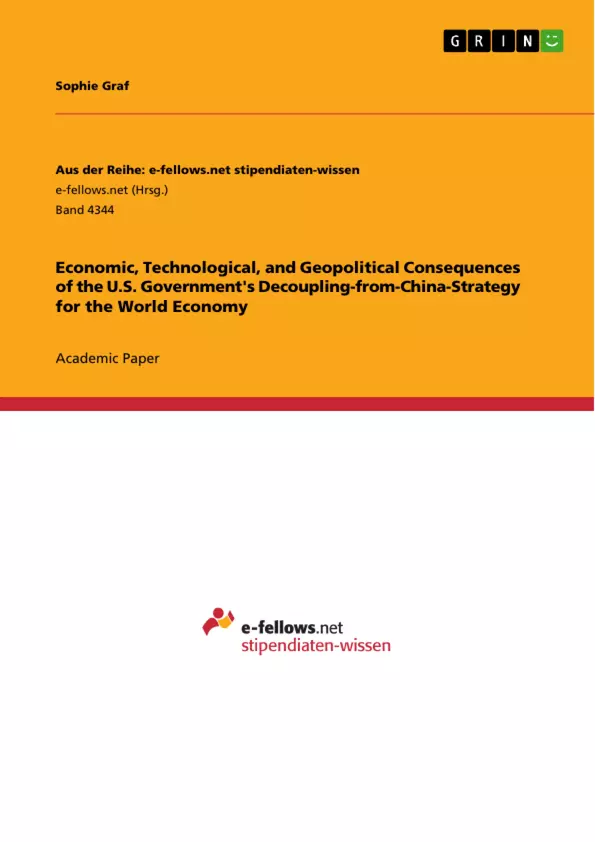The relationship between the United States (U.S.) and China has increasingly strained, particularly concerning economic ties. The outbreak of the pandemic highlighted significant reliance on Chinese exports, notably in crucial sectors like medical supplies. This dependency has led to discussions regarding the necessity of reducing ties with China, a concept commonly referred to as decoupling.
Decoupling, advocated by former U.S. President Donald Trump and continued by the Biden administration, involves efforts to lessen dependence on Chinese trade for reasons such as national security and economic autonomy. This paper aims to explore the implications of such a strategy, examining its historical background, economic motivations, and consequences.
Beginning with an overview of the escalating conflict between the U.S. and China, the origins of Chinese economic growth and American concerns will be delved into. The different forms of decoupling, from targeted sectorial disengagement to broader geopolitical shifts, will be analyzed.
Additionally, the economic and technological impacts of decoupling, including measures taken by both U.S. and Chinese governments and their effects on the global economic landscape, will be assessed. Furthermore, the geopolitical implications, considering how decoupling may influence international relations and global governance structures, will be examined.
By evaluating these aspects, this paper aims to provide insights into whether decoupling serves the interests of Western nations or if it risks exacerbating tensions and economic disruptions. This analysis contributes to the ongoing discourse on U.S.-China relations and the evolving dynamics of global economic interdependence.
Inhaltsverzeichnis (Table of Contents)
- Introduction
- Background of the escalating conflict and types of decoupling
- Rise of China and Development conflict
- Analysis and Critical Discussion
- Economic/Technological developments and consequences
- Measures of Trump administration and countermeasures China
- Measures of Biden administration and countermeasures China
- Concluding evaluation
- Geopolitical developments and consequences
- Measures of Trump administration and countermeasures China
- Measures of Biden administration and countermeasures China
- Concluding evaluation
- Economic/Technological developments and consequences
- Summary
Zielsetzung und Themenschwerpunkte (Objectives and Key Themes)
This paper aims to analyze the potential consequences of decoupling between China and Western countries, particularly the U.S. It investigates whether decoupling will be beneficial or detrimental for the Western economies and explores the broader impacts on the global economy.
- The escalating conflict between the U.S. and China
- China's economic development and its shift to a market-based system
- Different types of decoupling and their potential consequences
- The role of the U.S. and China in shaping the global economic landscape
- The impact of decoupling on various sectors of the world economy
Zusammenfassung der Kapitel (Chapter Summaries)
- Chapter 1: Introduction
The introduction sets the stage for the paper, highlighting the growing dependence of Western countries on Chinese products and the potential implications of decoupling. It introduces the research question and outlines the structure of the paper.
- Chapter 2: Background of the escalating conflict and types of decoupling
This chapter explores the historical context of the U.S.-China relationship, focusing on China's economic rise and its implications for the global economic order. It delves into the concept of decoupling and its different forms.
- Chapter 3: Analysis and Critical Discussion
This chapter analyzes the potential consequences of decoupling in terms of economic and geopolitical developments. It examines specific measures taken by the U.S. and China, along with their countermeasures.
Schlüsselwörter (Keywords)
Key terms and concepts discussed in this paper include decoupling, economic interdependence, China's economic rise, trade wars, geopolitical rivalry, U.S.-China relations, Belt and Road Initiative (BRI), global economy, and international relations.
- Quote paper
- Sophie Graf (Author), 2022, Economic, Technological, and Geopolitical Consequences of the U.S. Government's Decoupling-from-China-Strategy for the World Economy, Munich, GRIN Verlag, https://www.hausarbeiten.de/document/1448980


